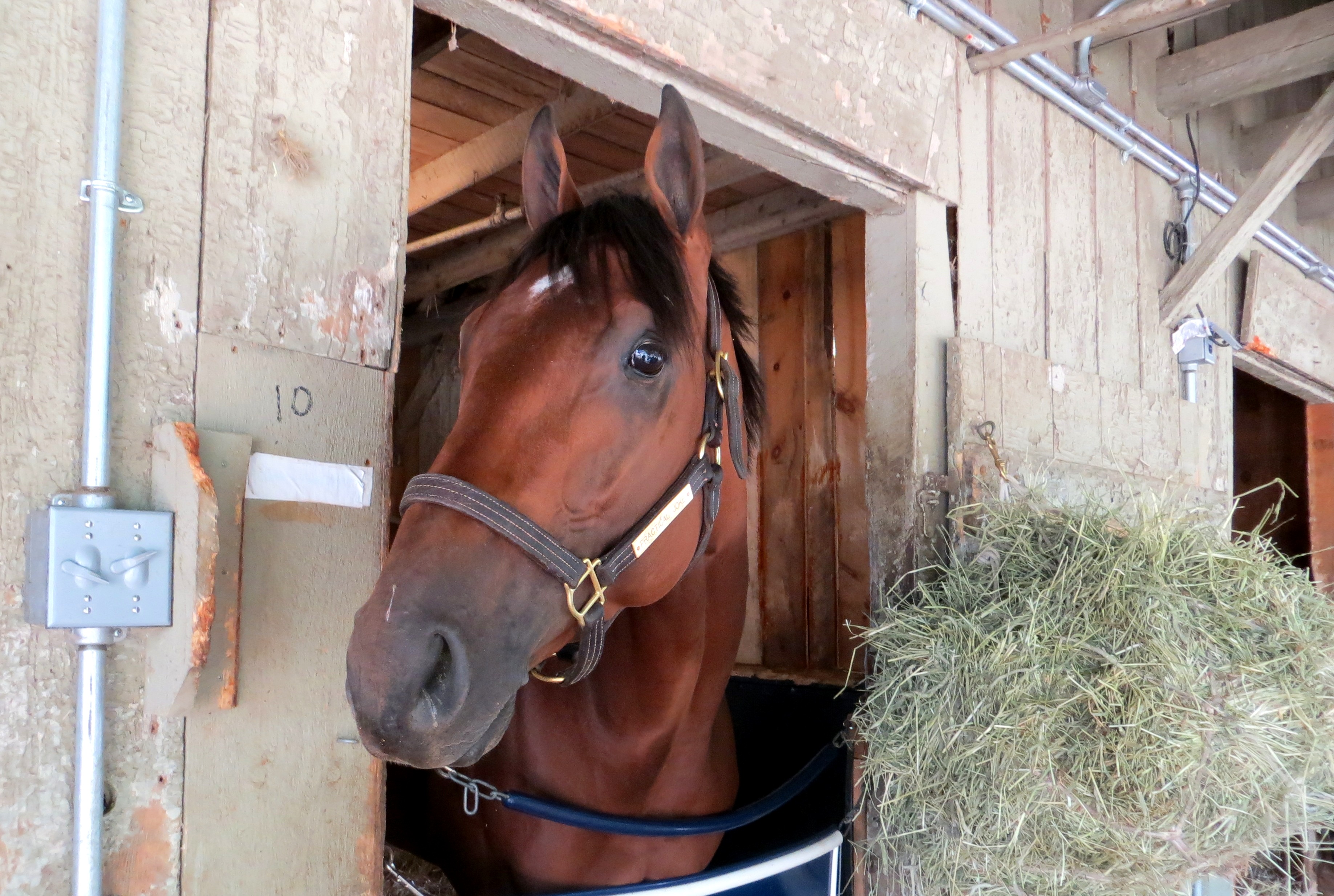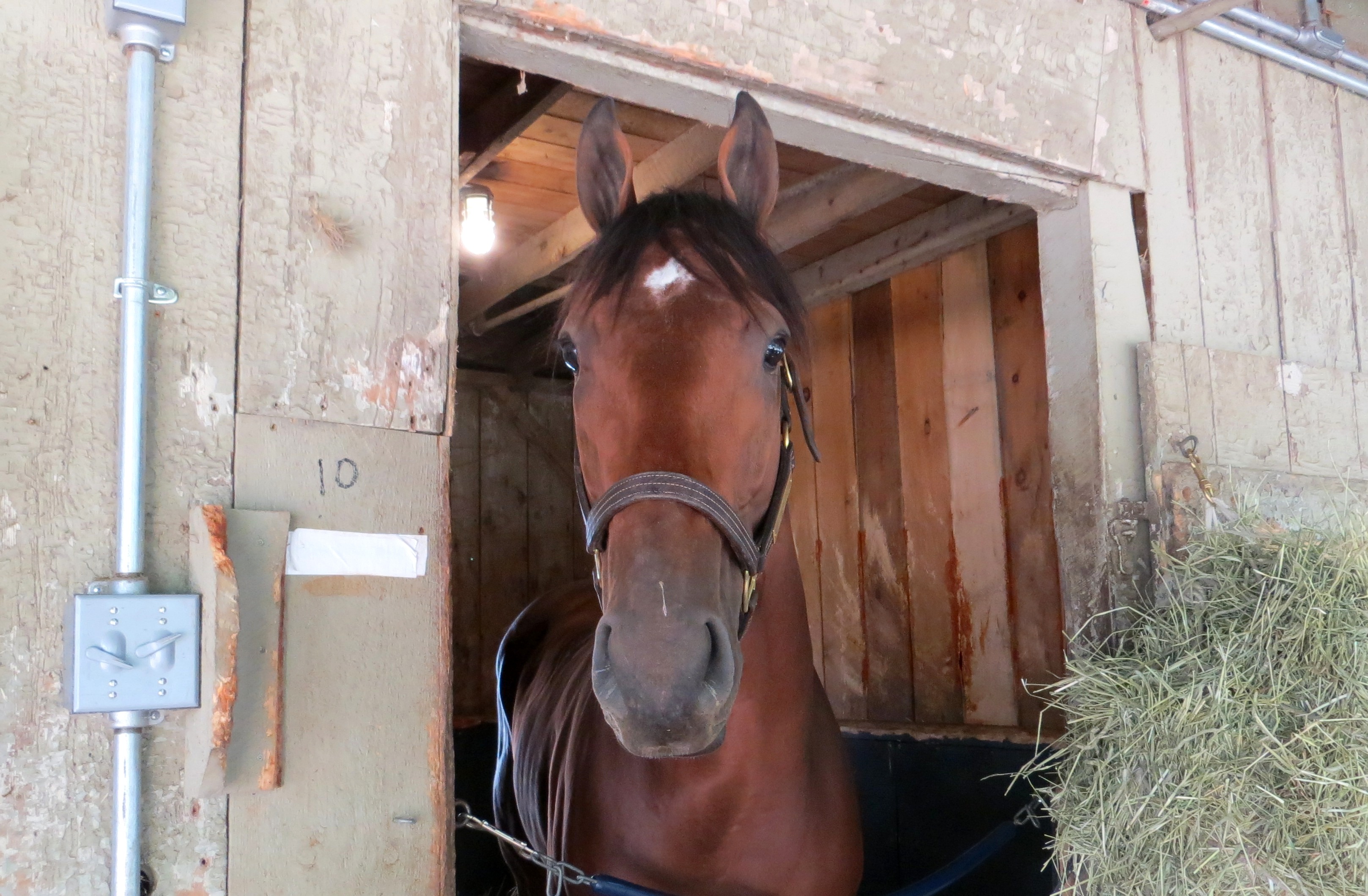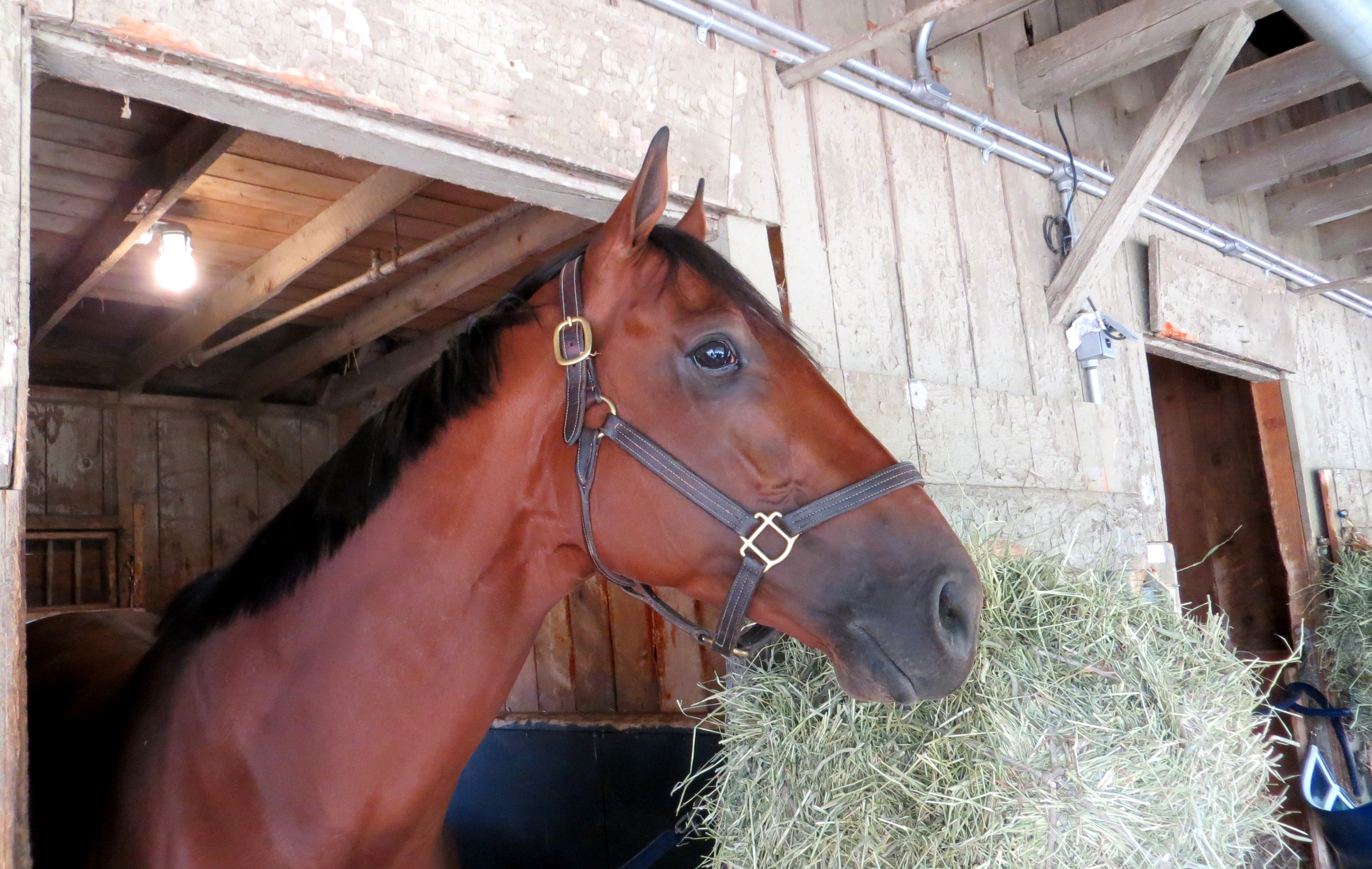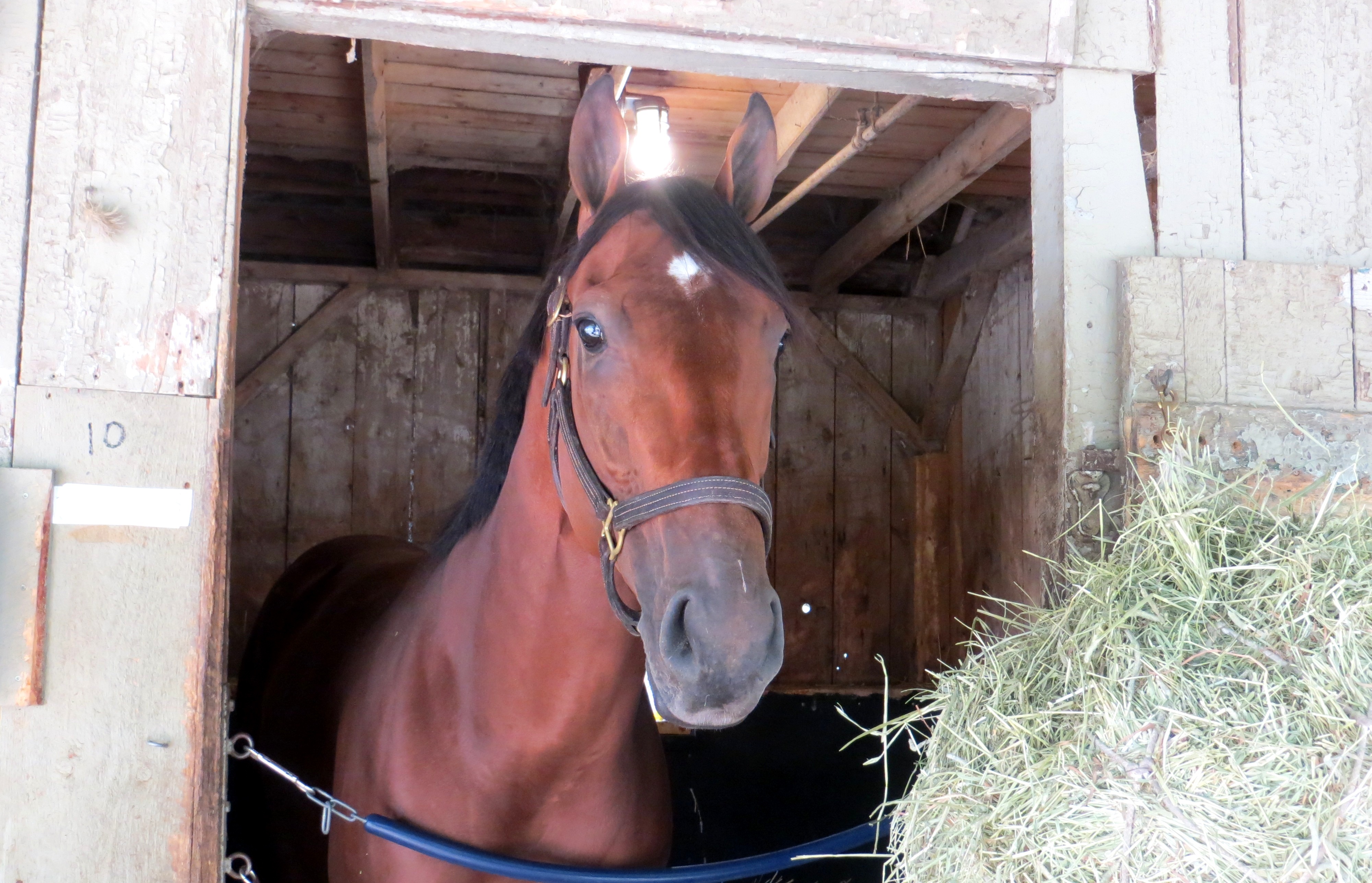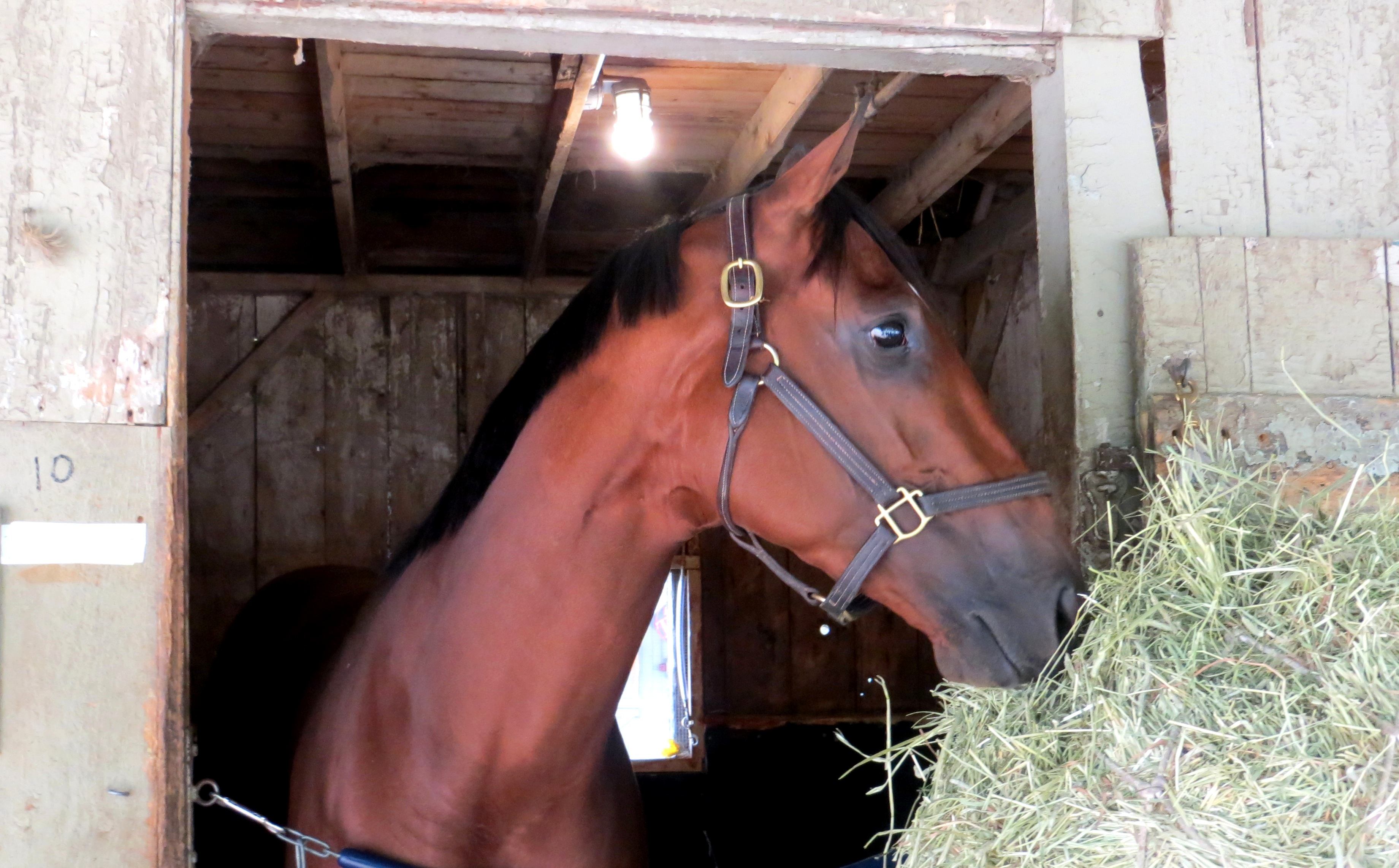West Coast, Irap, and Tapwrit
still need another big victory. Oscar Performance could jump in from the grass
category and snatch it away, but needs to beat older horses at 1 1/2 miles.
Always Dreaming and Cloud Computing have self destructed following their
classic victories. Classic Empire looks as if he needs time to totally regroup
following what amounts to a lost year. Girvin needs to rebound big-time off a
poor effort in the Travers Stakes.
Those are the big-name 3-year-olds who at some point have made a claim at the
3-year-old title. But in a year when inexplicable clunkers have dominated the
division, there is one horse who has run well all year without missing a beat
and seems to finally have found his niche. With victories in the grade 1 H.
Allen Jerkens Stakes and Dwyer Stakes and placings in the Haskell Invitational,
Blue Grass Stakes, and Fountain of Youth, and a solid showing in the Kentucky
Derby, don't shortchange the ultra consistent Practical Joke if he should
defeat older horses in the seven-furlong Bold Ruler Stakes and grade 1 Cigar
Mile.
That is the thought process right now of trainer Chad Brown, who is a bit
dubious at the thought of shipping to Del Mar, traditionally a non-friendly
Eastern track, to run in a two-turn mile where an outside post would likely be
disastrous, especially considering Practical Joke is five-for-five around one
turn and 0-for-5 around two turns, The upside would be a victory in a Breeders'
Cup race could propel him directly to the head of the division. But it's still
a gamble going out there.
There is an old racing term you never hear anymore. It used
to be said of horses who were sound, tough, and always gave 100 percent, they
were all hickory. It was an excellent description considering that the wood of
the hickory tree is known for its strength and durability.
In the War of 1812, Andrew Jackson exhibited such strength
of leadership and determination in battle he became known as "Old Hickory."
You don't see the term hickory used much anymore when it
comes to Thoroughbreds. Perhaps because there are so few left who remember when
it was commonplace or have no idea what it even means. Or maybe it's because we
have so few horses left who are worthy of the term.
That is why a horse like Practical Joke is so important to
the sport and should be admired. He has not captured any classics or even
placed in any and has never been ranked up at the top of any lists of leading
3-year-olds.
But there is no one who can deny that he is all
hickory; an old fashioned type of hard-knocking competitor you used to see at a
time when Thoroughbreds were tough and resilient and went out there time after
time and gave every ounce of themselves. They weren't flashy looking; normally strong-boned,
muscular bays who wouldn't stand out in a crowd. But they always showed up for
battle, and no matter the distance, whether it was their best or not, they
fought every step of the way and made their competitors run career-best efforts
to beat them.
Not only is Practical Joke an old school type of horse from
a physical and competitive sense, he is a throwback in that he has a penchant
for winning historical races that have defined the sport for over a century.
The first three stakes he won, the Hopeful, Champagne, and Dwyer, were
inaugurated in 1903, 1867, and 1887, respectively. And his final stakes
victory, the H. Allen Jerkens Stakes, was named after arguably the most
old-school, hard-nosed trainer of modern times.
Although entered in the Allen Jerkens, Chad Brown thought
long and hard about whether to run him, and conferred with majority owner Seth
Klarman about his concerns. The Jerkens would be his third start in seven
weeks, having come off a gut-wrenching effort in the 1 1/8-mile Haskell Invitational,
in which he battled between horses to the wire, only to be beaten a
half-length. In the Jerkens, he would be up against some of the fastest
3-year-old sprinters in the country going seven furlongs and would have to
break from the disadvantageous one-post. It wasn't until the last minute that
Brown decided to go.
Practical Joke sat back in seventh early and under a
masterful ride by Joel Rosario, he mowed them all down in the stretch to win
going away by 1 1/4 lengths in a sharp 1:21 4/5. The victory extended Practical
Joke's unbeaten record around one turn to five. He has now won at six furlongs,
seven furlongs twice and a flat mile twice.
Despite questions regarding his ability to stretch out to a
mile and a quarter, or even two turns for that matter, I still ranked him at
No. 5 on my first Derby Dozen on January 24 because of his class and courage under fire, and having won
the two most historical 2-year-old stakes in New York, the Hopeful and
Champagne, both of which he won on sheer guts. Many feel he won the Hopeful
only because Classic Empire self destructed at the break, throwing his
rider. But he did what he had to, coming off only one six-furlong maiden
victory and prevailed in a hard-fought three-horse photo.
He then out-dueled the speedy Syndergaard in the Champagne
in one of the most exciting races of the year. Although Syndergaard was praised
for his courage after battling through fast fractions, Practical Joke did not
receive the recognition he deserved, rallying from nine lengths back and
beating an exceptionally fast horse after a testing stretch battle in the final
furlong over a track where speed horses often keep going regardless of the
fractions. And it was important to note that Practical Joke ran the mile in a
brilliant 1:34 3/5, just two-fifths off Devil's Bag's stakes record. Of the few
horses who have broken 1:35 in winning the Champagne, Practical Joke ran faster
that Spectacular Bid and Easy Goer and was just one-fifth off Seattle Slew's
one-time stakes record.
It was a tall order asking him to come back in the Breeders'
Cup Juvenile, stretching out to two turns for the first time, after such a
grueling battle going a flat mile. It was no surprise that he regressed
slightly, but still finished third, despite not having the cleanest of trips,
losing momentum when Not This Time came in and forced him to alter course at
the three-sixteenths pole.
Making his 3-year-old debut off a four-month layoff, he made
a huge premature move, but couldn't sustain it, finishing second to Gunnevera,
another of those old-school hickory horses who give their all every time and
keep coming back for more. When it comes to an explosive turn of foot, no one
can match Gunnevera on his best day.
When Practical Joke came back and finished second, beaten
three-quarters of a length by Irap, in the Blue Grass Stakes, it solidified the
belief that he was much better going one turn. But it's rare to get this far
and then back off from running in the Kentucky Derby. So he understandably took
a shot, and despite breaking from post 19, he ran an excellent race to finish
fifth of 20 starters, beaten less than two lengths for third.
Brown decided to drop him back to one turn in the Dwyer,
where he looked hopelessly trapped turning for home, but waited patiently until
he was steered to the far outside. Once clear, he charged to the lead and drew
off to win by two lengths in a sharp 1:35 flat.
Brown decided to give him another shot at two turns in the
Haskell, and although he again was trapped down on the inside, he ran his heart
out and was just nipped in a three-horse blanket finish.
Despite coming off such a tough race, which took its toll on
the first two finishers, Brown, as mentioned earlier, decided to go for the
Jerkens, and, yes, he was again stuck down on the rail. But a hole quickly
opened up at the top of the stretch and he shot right through, running down the
pace-setting Takaful to win going away.
So, in 10 career starts, Practical Joke has been in the
money nine times, competing at seven different racetracks from coast to coast, and
still picked up $60,000 for finishing fifth in the Kentucky Derby at a distance
believed to be far beyond his best.
He is one of several other top-class mile to 1 1/8-mile
stakes horses sired by Spendthrift Farm's big find, Into Mischief, along with
Santa Anita Derby winner and two-time Breeders' Cup Dirt Mile winner
Goldencents; Louisiana Derby and Super Derby winner Vicars in Trouble, who
placed three other Derbys; and Vyjack, winner of the Jerome, Gotham, and Kelso Stakes
- all tough, hard-knocking horses.
Add Practical Joke and Into Mischief's four million-dollar
earners won or placed in 43 stakes.
Chad Brown is amazed at Practical Joke's toughness and will
be the first to tell you he wishes he had a barnful of horses like him. That is
no surprise to Nick de Meric, who gave Practical Joke his early training at his
farm in Ocala and prepared Seth Klarman and Brown for what they were about to
receive in his monthly updates.
"He was a very tractable, amenable colt to work around, both
under tack and around the barn," de Meric said. "He was and still is built like
a dragster - powerful, blocky, with a great big hip on him and beautifully put
together. And he was very correct and very sound, and was precocious enough that
he was one of the first ones we sent to Chad.
"He took to his early lessons really well, was quick out of
the gate, and showed us tremendous foot in his breezes. He's just a colt you'd
love to fill a barn with. Of course, you never know how they're going to be
when it gets really down and dirty in that final sixteenth and they have to gut
it out against tough competition in graded stakes company. But he gave us all
the right messages. He was competitive without being difficult to work with. He
was always ratable. We felt very positive about him when he left here."
De Meric has seen all those qualities carry over on to the
racetrack, and like Brown is amazed by the colt's toughness, honesty, and
competitive spirit.
"He runs his eyeballs out every time you load him in the
starting gate and you better be tied on and ready for a tough scrap at the end
of the race, because he is pure heart," de Meric said. "He's probably the most
consistent and honest 3-year-old out there and is totally dominant at his best
distances. He's shown that is a mile or less, but he's also shown he is still
extremely tough going a mile and an eighth."
So here we are in September with the 3-year-old title still
up for grabs, as classic horses, distance specialists, and even a grass horse
all vie for the Eclipse Award, which very likely will be determined by how they
fare against older horses.
But championships aside, in a year filled with inconsistency
and perplexing performances, it is at least reassuring to know there is one
horse out there who can rekindle memories of years past when horses were made
of sinew and steel, never backed down in a fight, and would scrape and claw for
every inch of ground.
His name may evoke images of whoopee cushions and joy
buzzers, but you can bet his opponents will be taking him seriously the rest of
the year.
